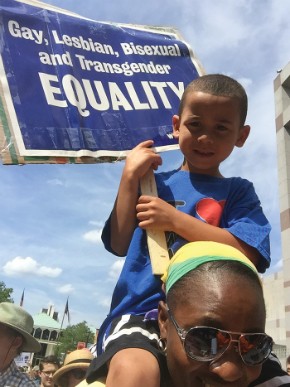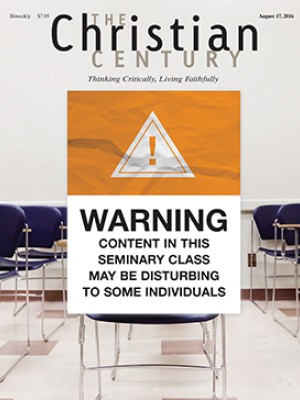Other kinds of others: A Chapel Hill church redefines open and affirming

It was the congregation’s open and affirming stance that brought Robbyn Davis-Ellison to United Church of Chapel Hill, North Carolina, but it was the commitment to racial justice that kept her there. Davis-Ellison, who is black and gay, grew up in a Pentecostal Holiness church in suburban Atlanta. By age nine she knew she was “different,” and after high school she stopped going to church.
“I had been brainwashed into thinking that homosexuality is a sin, and we were going to go to hell, and I wasn’t going to be with my family when I passed away,” she said. “When you’re a little girl, that’s really scary.”
After college she found a gay-friendly church, but when work took her to California and New Jersey, she lost touch with her faith, which had always been a sense of comfort to her.
“Religion was my fallback. No matter how bad things got, I always had God,” she said. “Without that, who would I go to?”
Davis-Ellison married in Canada, and she and her wife moved to Chapel Hill, North Carolina. In 2010 they attended a service at UCCH, a congregation that had declared itself open and affirming in 1993. That was enough to get the Davis-Ellisons in the door.
Read our latest issue or browse back issues.
“Anyone from any denomination who was seeking a church around orientation or identity wanted to check out UCCH,” says young adult and youth pastor Jenny Shultz. “There are so many barriers to accessibility that if you are an ‘Other-times-5,’ and the widened welcome is offered intentionally to you, that’s a place where you can walk through the door. You think, ‘Oh, maybe this can mean me, too.’”
It’s a story that’s been repeated many times at UCCH since it began welcoming gays and lesbians. They came, and because many were people of color, the makeup of the congregation also became more racially diverse.
Twenty years after UCCH made the decision to join the denomination’s Open and Affirming Coalition, nearly one in ten UCCH members identify themselves as gay, lesbian, bisexual, transgender, or queer. Many are married, some legally, and some are in interracial relationships. Some couples have adopted children from around the world or from nonwhite mothers.
Still, the majority of the members are white, and that makes newcomers like Davis-Ellison worry about acceptance.
“The predominately white makeup of the church was a throw-off for me,” she said. “This was an open and affirming church, but were the people going to be open to me, an African American with African-American kids? It was all these white people. Were they going to be OK? Was someone going to say something crazy because I’m black, and my kids are black?
“To my surprise, over the years, that’s one of the things that’s been the beauty of it,” she said. “It was the church that spoke about racial equality. To hear a white pastor tell your congregation, ‘You need to understand your white privilege,’ was something I never thought I was going to hear.
“That kept me going,” she said. “I was programmed to think that white people were prejudiced, especially white males. Now I say, ‘Wow, I actually have older white male friends who are not bigoted!’ That I didn’t expect. I love being in a church full of white people who are trying to understand the black plight.”
As a social worker, Davis-Ellison specializes in helping children with emotional and behavioral disorders. Her five kids came to her as foster children, and all had been exposed to drugs in their birth mothers’ wombs. Being able to talk about their real-life experiences makes UCCH a safe place for Davis-Ellison and her kids.
“I was trying to teach my kids about God because I felt like I had been skewed. Love the sinner, hate the sin. That was how I’d been taught, and I needed my kids not to be taught that way,” she said.
Her 13-year-old twin sons have worked on a Black Lives Matter art project with other kids from UCCH and from Judea Reform Congregation in Durham.
“I feel like people care,” says her son Amir. “People should love everybody for who they are, not on the basis of skin color.”
The boys deal with racist and homophobic talk at school.
“It’s tough trying to navigate all these issues. It’s always nice on Sunday for us to have somewhere to go to get the stress and stuff out,” said Davis-Ellison.
“My boys, for example, feel like they’re in a constant battle fighting against all these isms,” she said. “The kids who are in our church youth group, they’re getting it.”
UCCH has been trying to attract people of color for decades. In the 1960s, pastor Dewitt Myers hosted Martin Luther King Jr. in his home in spite of threats from the KKK. And for more than 20 years, the church has supported United Voices of Praise in partnership with a black Pentecostal Holiness church in nearby Durham. The mixed-race gospel choir rotates between Sunday services at the two churches and has toured across the United States and Europe.
But it was the O&A covenant that brought people of color.
“O&A didn’t bring in only gay and lesbians,” said Shultz. “African Americans who’d been in this community came, maybe because they were raised in more suburban white communities and identified more with white middle-class communities.”
UCCH’s social justice efforts have included scores of UCCH congregants marching in the North Carolina NAACP’s Moral Mondays movement, and 17 of them have been arrested in acts of civil disobedience. Jill Edens, who was among them, says that encountering the legal system as a defendant is an important step in understanding mass incarceration and police profiling.
“Every middle-class person should have to do it,” she said.
Last fall UCCH hosted Jeremiah Wright, former pastor at Trinity UCC in Chicago, and this spring UCC president John Dorhauer led a workshop on racial justice. At its annual meeting in June, the congregation adopted a covenant identifying UCCH as “among those seeking the abolition of racial inequity and white supremacy.” The covenant is a natural extension of the O&A covenant, as members of many same-sex couples at UCCH are of two different races, like Davis-Ellison and her white partner.
Shultz acknowledges that in spite of all of these initiatives, UCCH is not diverse in every way. It’s a wealthy church, she says, with little socioeconomic diversity.
“We all come from the same place, and that’s challenging even in the most progressive communities. We’re advocating for diversity because we can. We have the power to do that. It’s difficult to put yourself in the place of the other when you don’t self-identify like that.”
In 2010, race relations took a step forward in the Raleigh–Durham–Chapel Hill region when black Pentecostals and white Congregationalists in the United Voices of Praise choir began to talk about race. Many have been friends for more than a decade, but it wasn’t until choir member Wanda Hunter returned from a workshop on race that black people in the choir began to talk about their experiences of racism.
“We had never talked about race and racism, or what so deeply separates us in terms of our life circumstances.”
Eight choir members from UCCH and eight from Durham’s Fisher Memorial United Holy Church began that conversation, and eventually they formed Organizing Against Racism, a network of groups that offers workshops in the Raleigh–Durham–Chapel Hill area. Today nearly a hundred UCCH members and more than 2,000 people in the area have trained with Greensboro’s Racial Equity Institute.
UCCH member Debby Stroman, who teaches at the University of North Carolina-Chapel Hill, convinced the university to add a course titled Leading for Racial Equity which brings students from different academic departments together to analyze their institutions and disciplines for systemic bias. There’s a move to change the names of campus buildings associated with the Ku Klux Klan and other individuals who upheld slavery and segregation. But Stroman cautions that the efforts will take time.
“It took 400 years to put us where we are today,” she said. “Every large white school is wrestling with institutional racism. It’s good to know that we have people who have gone through racial equity training at the table who can offer solutions.”
In the institute’s workshops, participants go through two phases of training: a big-picture cultural analysis and trial-and-error activism within their communities. Following their workshop sessions, some participants continue to meet in separate white and people-of-color caucuses, where they strategize how to dismantle racist structures within their local communities and institutions.
“Some people think racism is just about ‘those people’s’ attitudes,” said institute managing director Deena Hayes-Greene. “You can send those people ‘to the moon’ and you’ll still have an achievement gap, you’ll still have health disparities, you’ll still have injustice in our judicial system.”
Richard Edens, who copastors UCCH with his wife Jill, says that’s why it was so important for groups to dig into structural racism.
“Friendship alone doesn’t really change things,” said Edens.
As a retired social medicine researcher, Hunter sees how certain health problems disproportionately affect African Americans.
“Race is the most significant predictor of almost every measure of human well-being,” she said. “Despite all of our best intentions, we are unconscious about this. We’re part of this system, and it just runs on autopilot.”
At UCCH these days, a visitor will see a range of skin tones in the nursery, Sunday school classrooms, or youth group; 10 percent of the adults are LGBTQ, and one in eight of their adopted children is nonwhite.
“When you’re a predominately white community, more than 5 percent or 3 percent [nonwhite] can be powerfully transformative,” said Shultz. “We just allow their voices to lead us.”
Yet visitors walking into United Church’s 11 a.m. worship still see mostly white people—only about two dozen black or Asian adults attend.
Davis-Ellison believes that the key to bringing others into worship is the music. For some worshipers, the traditional European and white American hymnody is theologically dense and impersonal, and black church music, she says, gives expression to human struggle and suffering. Its rhythms and dynamics invite participation.
“Historically,” Davis-Ellison said, “the music is the builder of what gets you through the week. When things were bad, my mom played the blues in the house. Music pulls you up and gets you rejuvenated for another week, because you know it’s going to be tough.”
When United Voices of Praise leads worship on the fourth Sunday of every month, the choir gives Davis-Ellison an echo of her black church experience.
“That’s the piece I miss. That’s what UCCH is missing in terms of pulling in minorities.”
Charles Bradshaw, musical director of the choir, has been leading worship in multiracial settings for nearly three decades. He says that changing a church’s musical style is a slow process.
“The ideology of worship from one culture to another is totally different. We work toward it a step at a time and show that we can worship together. On both sides, we’re beginning to open our minds.”





